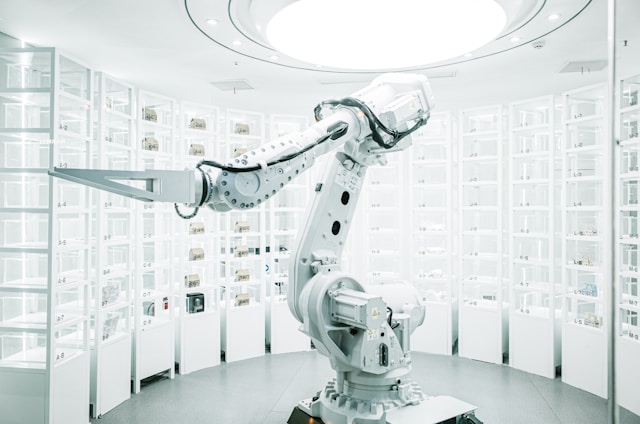AI’s Impact on Our Daily Lives: A Deep Dive
Artificial Intelligence (AI) has rapidly infiltrated our daily lives, transforming the way we interact with technology and the world around us. From the smartphones we use to the apps we rely on, AI is quietly revolutionizing various aspects of our lives.
Personal Assistants: Siri, Alexa, and Google Assistant have become our go-to companions, capable of setting alarms, answering questions, and controlling smart home devices. These AI-powered assistants streamline our tasks and make our lives more convenient. For instance, we can simply ask our assistant to turn off the lights, play our favorite music, or even order food.
Recommendation Systems: AI algorithms analyze our browsing history, preferences, and interactions to suggest products, movies, and music that align with our interests. This personalized experience enhances our online shopping and entertainment. For example, when we browse a streaming service, AI-powered recommendations suggest movies and TV shows that we might enjoy based on our past viewing history.
Social Media: AI powers the algorithms that curate our social media feeds, ensuring we see content that is relevant and engaging. While this can be beneficial, it also raises concerns about the potential for echo chambers and misinformation. AI-driven algorithms can sometimes reinforce existing biases and limit our exposure to diverse viewpoints.
Healthcare: AI is revolutionizing healthcare by assisting in diagnosis, drug discovery, and personalized treatment plans. From analyzing medical images to predicting disease outbreaks, AI is improving patient outcomes and reducing costs. For instance, AI-powered systems can analyze medical scans to detect early signs of cancer or other diseases, enabling timely intervention.
Transportation: Self-driving cars are becoming a reality, promising to reduce accidents and improve traffic flow. AI is also being used to optimize public transportation systems and enhance logistics efficiency. Autonomous vehicles have the potential to transform transportation, making it safer, more efficient, and more accessible.
Customer Service: AI-powered chatbots and virtual assistants are increasingly used to handle customer inquiries and provide support. While they can be efficient, there is a growing concern about the lack of human connection and empathy in these interactions. Chatbots can provide quick and accurate responses to common queries, but they may struggle to handle complex or emotional issues.
Education: AI can personalize learning experiences, adapting to individual students’ needs and paces. Intelligent tutoring systems can provide personalized guidance and feedback, helping students achieve their full potential. AI-powered tools can also help educators assess student progress and identify areas where they may need additional support.
Financial Services: AI is used to detect fraud, assess creditworthiness, and provide personalized financial advice. This technology is making financial services more accessible and efficient. AI-powered algorithms can analyze vast amounts of data to identify patterns of fraudulent activity and prevent financial losses.
Privacy and Security: While AI offers numerous benefits, it also raises concerns about privacy and security. The collection and analysis of personal data can lead to potential misuse and surveillance. As AI becomes more pervasive, it is crucial to address privacy concerns and ensure that personal data is protected from unauthorized access.
Conclusion
AI has become an integral part of our daily lives, transforming various aspects of our interactions with technology and the world around us. While AI offers numerous benefits, it is essential to approach its development and implementation with a focus on ethical considerations and societal well-being. By harnessing the power of AI responsibly, we can create a future where technology enhances our lives, rather than threatens it.
AI in Action: Real-World Examples
Healthcare:
- Diagnosis: AI-powered systems can analyze medical images, such as X-rays and MRIs, to detect abnormalities that may be missed by human doctors. For example, a deep learning algorithm can accurately diagnose skin cancer with a high degree of accuracy, often outperforming human dermatologists.
- Drug Discovery: AI can accelerate the process of drug discovery by simulating molecular interactions and predicting the effectiveness of potential drug candidates. This can significantly reduce the time and cost of developing new treatments for diseases.
Transportation:
- Autonomous Vehicles: Self-driving cars are becoming a reality, with companies like Tesla and Waymo testing vehicles on public roads. These cars use AI to perceive their surroundings, make decisions, and navigate safely.
- Traffic Optimization: AI can analyze traffic patterns and optimize traffic flow to reduce congestion and improve travel times. For example, AI-powered systems can adjust traffic signals in real-time based on current traffic conditions.
Customer Service:
- Chatbots: AI-powered chatbots can handle customer inquiries and provide support, often 24/7. These chatbots can answer frequently asked questions, provide product recommendations, and even process simple transactions.
- Personalized Recommendations: AI can analyze customer data to provide personalized recommendations for products or services. For example, online retailers use AI to suggest items that a customer might be interested in based on their past purchases and browsing history.
Education:
- Personalized Learning: AI can adapt educational content to individual students’ needs and paces. For example, AI-powered tutoring systems can provide personalized guidance and feedback, helping students learn at their own pace.
- Intelligent Grading: AI can automate the grading of assignments and exams, freeing up teachers to focus on more personalized instruction.
Finance:
- Fraud Detection: AI can detect fraudulent activity by analyzing patterns in financial data. For example, AI-powered systems can identify unusual transactions that may be indicative of fraud.
- Algorithmic Trading: AI can execute trades at high speeds, often faster than human traders. This can allow traders to capitalize on market opportunities and reduce risk.
These are just a few examples of how AI is being used in our daily lives. As AI technology continues to advance, we can expect to see even more innovative applications in the future.




